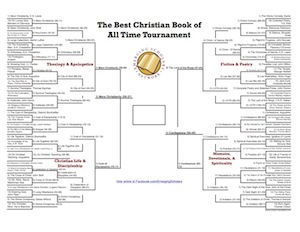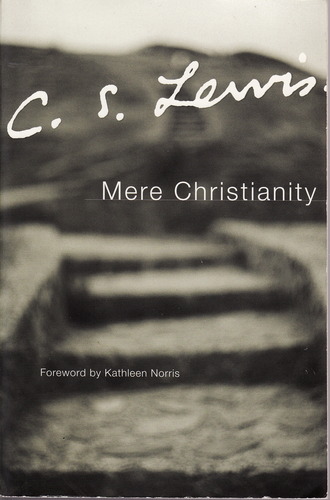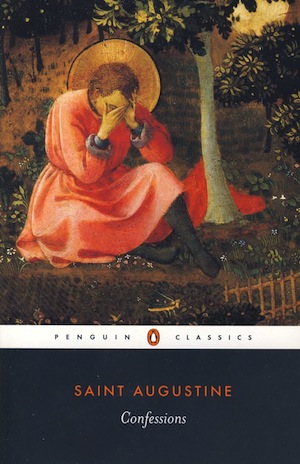
It has come to this. The two best books in the history of Christianity have been chosen by you, our readers and Emerging Scholars Network members, and we’re ready to answer the question of which book is the best Christian book of ALL TIME.
Of course, this isn’t the kind of question that sits well with all people. Now that we have moved beyond the brackets and are asking voters to choose between books of radically different genres and purposes, the difficulty of choosing between these books is increasing. Here are a few of the comments received on our Facebook Page about the match-up between The Lord of the Rings and Confessions.
This one is incredibly difficult – perhaps because the volumes have such disparate goals and content.
These are like comparing apples and oranges…
More like comparing apples and eggs. Both works are essential Christian reads. Can’t choose.
The choice might have even been starker between Mere Christianity —a relatively short work of apologetics meant to introduce readers to Christianity —and The Cost of Discipleship —the principal work of one of the twentieth century’s most influential theologians. On Facebook, commenters struggled with the comparison. I felt like this comment summarized the difficult decision well:
I love both, but I love more that [C.S. Lewis] wrote his as a series of broadcasts designed to hit the core of the thing for a people in need of comfort, truth, and certainty.
Bonhoeffer is then the best kind of main course.
Unfortunately, there can be only one winner! Let’s see who will be competing for the title Best Christian Book of All Time.
Final Four Results
In the contest between our Theology & Apologetics and Christian Life & Discipleship brackets, Mere Christianity by C.S. Lewis (1) defeated The Cost of Discipleship by Dietrich Bonhoeffer (1) by a score of 55-37.
Meanwhile, in the choice between the winners of the Fiction & Poetry and Memoirs, Devotionals, & Spirituality brackets, it was Confessions by Augustine (1) over The Lord of the Rings by J.R.R. Tolkien (2) 54-45.
Championship Pairing
Mere Christianity by C.S. Lewis (1) vs. Confessions by Augustine (1)
The Tale of the Tape
Mere Christianity
Author: C.S. Lewis (1898-1963)
Published: 1952, based on a series of BBC radio addresses given between 1942 and 1944
Original language: English
Length: 227 pages (Harper San Francisco paperback edition)
Seeding: #1 seed in the Theology & Apologetics bracket
Summary: An apologetic for and introduction to Christian belief, Mere Christianity begins by using basic moral law as a foundation for belief in an objective moral reality, which may or may not be Christian. Lewis then proceeds to introduce the basics of Christian theology and ethics, then ends with a case for the Trinity and conversion.
Claims to Fame: Named #3 in Christianity Today‘s Top 50 Books That Have Shaped Evangelicals. Credited by Charles Colson, Francis Collins, and thousands of others as integral to their conversion to Christianity.

Famous quote:
I am trying here to prevent anyone saying the really foolish thing that people often say about Him: I’m ready to accept Jesus as a great moral teacher, but I don’t accept his claim to be God. That is the one thing we must not say. A man who was merely a man and said the sort of things Jesus said would not be a great moral teacher. He would either be a lunatic —on the level with the man who says he is a poached egg —or else he would be the Devil of Hell. You must make your choice. Either this man was, and is, the Son of God, or else a madman or something worse. You can shut him up for a fool, you can spit at him and kill him as a demon or you can fall at his feet and call him Lord and God, but let us not come with any patronizing nonsense about his being a great human teacher. He has not left that open to us. He did not intend to. – C.S. Lewis, Mere Christianity
Confessions
Author: Augustine of Hippo (354-430)
Published: 397/8
Original language: Latin
Length: 352 pages (Penguin Classics edition)
Seeding: #1 seed in the Memoirs, Devotionals, & Spirituality bracket
Summary: Part memoir, part theology, part Biblical commentary, Confessions records Augustine’s life, intellectual development, and spiritual journey from youthful hedonism and Manichaeism to Christianity. Throughout the book, Augustine interweaves his personal story with passages of Scripture, and Confessions ends with an extended commentary on the opening chapters of Genesis.
Claims to Fame: Often considered to be the first autobiography in the modern sense. Regarded as one of the most important and influential books of Western Christianity.

Famous quote:
Can any praise be worthy of the Lord’s majesty? How magnificent his strength! How inscrutable his wisdom! Man is one of your creatures, Lord, and his instinct is to praise you. He bears about him the mark of death, the sign of his own sin, to remind him that you thwart the proud. But still, since he is a part of your creation, he wishes to praise you. The thought of you stirs him so deeply that he cannot be content unless he praises you, because you made us for yourself and our hearts find no peace until they rest in you. – Confessions, Book I, Chapter I
Who will win?
What do you think of this match? Are these the books you would have chosen, or do you thinking someone was robbed along the way? Let us know in the comments.
Vote on Facebook to determine who will win the title Best Christian Book of All Time.
The former Associate Director for the Emerging Scholars Network, Micheal lives in Cincinnati with his wife and three children and works as a web manager for a national storage and organization company. He writes about work, vocation, and finding meaning in what you do at No Small Actors.

Wow. That’s an incredibly difficult choice. 🙂 On practically every level I can think of, I love both books. And even though they’re quite different, they occupy a similar place in my life in terms of how compelling and transformative they are in shaping my imagination.
Maybe one reason for that is that Tolkien may be building his world from partially Augustinian materials – I often think that Tolkien’s portrayal of what it means for something to be truly good is a wonderful translation of Augustine’s philosophy into narrative. But it probably doesn’t hurt that much of Augustine’s philosophy is told in narrative in Confessions, anyway.
So there’s a rambly set of thoughts on Tolkien, Augustine, and narrative which gets us no closer to choosing. Ah well. The only answer is to reread them both . . .
Great point about Tolkien and Augustine. I have not thought about it much, but Tolkien’s description of Sauron’s “creation” of the Orcs is very close to Augustine’s insight into evil — that evil cannot create anything new, but only twist and corrupt what has already been created.
I’ve occasionally thought about that, too – it’s fascinating, isn’t it? I think that’s one of the best things about Tolkien, the way that good in Tolkien is always larger and fuller and richer than evil, however large the evil seems to loom.